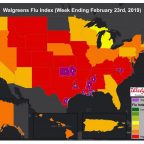Keep Holidays Safe and Festive for Your Pets
The end of the year marks many festive holiday gatherings for families around the world with rich foods, colorful decorations and wrapped gifts. Petland reminds everyone to remember their pets over the holidays and keep them safe from holiday hazards.
Seasonal care tips for pets
Here are a few other holiday tips from Petland to make the holidays more enjoyable for families and their pets, especially those living in geographical locations where cold weather is an added concern:
- No rich foods: Refrain from feeding your pet holiday table scraps. Your pet’s digestive system is not receptive to rich people foods. Also make sure to keep grapes, raisins and currants (in fruitcakes) out of your pet’s reach, as these are toxic to dogs and cats.
- Holiday decorations out of reach of paws: When not crated, your pet should be observed often over the holidays, making sure it is not endangering itself by chewing on Christmas paraphernalia, gifts and ribbons. Also beware of snow globes and bubble lights as the liquids inside can be toxic. Keep potpourri out of reach as well, as the smells can also be enticing to your four-legged friends.
- Oh Christmas Tree: Make sure your tree is secure, in a corner is best, especially if you have felines in your family! Keep the area around the tree clean and free from pine needles. The needs are sharp and can puncture your pet’s intestinal tract if ingested. Be careful with glass bulbs, lights, tinsel and wires – these can be harmful. Also try to avoid popcorn or cranberry strands on the tree as it may prove to be tempting for your pet!
- Dangerous holiday foliage: Keep pets from coming in contact with holiday plants – mistletoe, holly, and poinsettia. These traditional holiday plants can cause illness. Ingestion of these plants can be toxic to some animals. On contact with these plants, some pets may develop an irritating rash.
- Rap on the car hood: A warm automobile is a hotel for outdoor cats during the winter months. Every year thousands of cats, who take comfort in sleeping under the hood, are injured or killed when a driver returns to his car and starts the engine. A rap on the car hood before starting the engine will awaken a sleeping cat, giving it time to escape before you rev up and go.
- Keep Antifreeze out of reach: This is the time of year when antifreeze is used so be sure to store it safely out of reach. Antifreeze can smell good to pets, but it is highly toxic.
- Give water not ice: Pets who live outdoors during the winter must have fresh water to drink at all times. Water, however, can freeze in a matter of hours when temperatures go below freezing, 32 degrees Fahrenheit. Pet owners who can not replenish their pet’s dish with fresh water several times a day may need to use an electrically heated water dish.
- Provide proper shelter: Having a permanent fur coat does not make your pets safe from winter’s harsh blows. Cats and dogs that live outdoors must have a shelter equipped with clean, dry bedding. The shelter should be just big enough for the pet to get in and turn around. Having a larger cat or dog house is not beneficial, as the animal cannot use its natural body heat to warm the shelter area. Even pet birds housed inside need to have their cages located in places free of feather-chilling drafts.
- Dry those paws: The snow and salt that accumulates in your pet’s paws from daily winter romps can result in irritation, cracking and pain. Paws need to be checked daily and routinely cleaned and dried. A balm can be helpful in keeping your pet’s paws soft. Your pet’s coat should be dried off, too, as dampness and chilling can lead to illness.
- Quell anxiety: If your pet gets anxious around extra people in the house, consider a stress-relieving oil warmer or drops to help calm your pooch. A Thundershirt or compression jacket may also be beneficial. Make sure your pet always has a quiet place to rest during noisy holiday activities.
For more information on Petland, visit www.petland.com.






